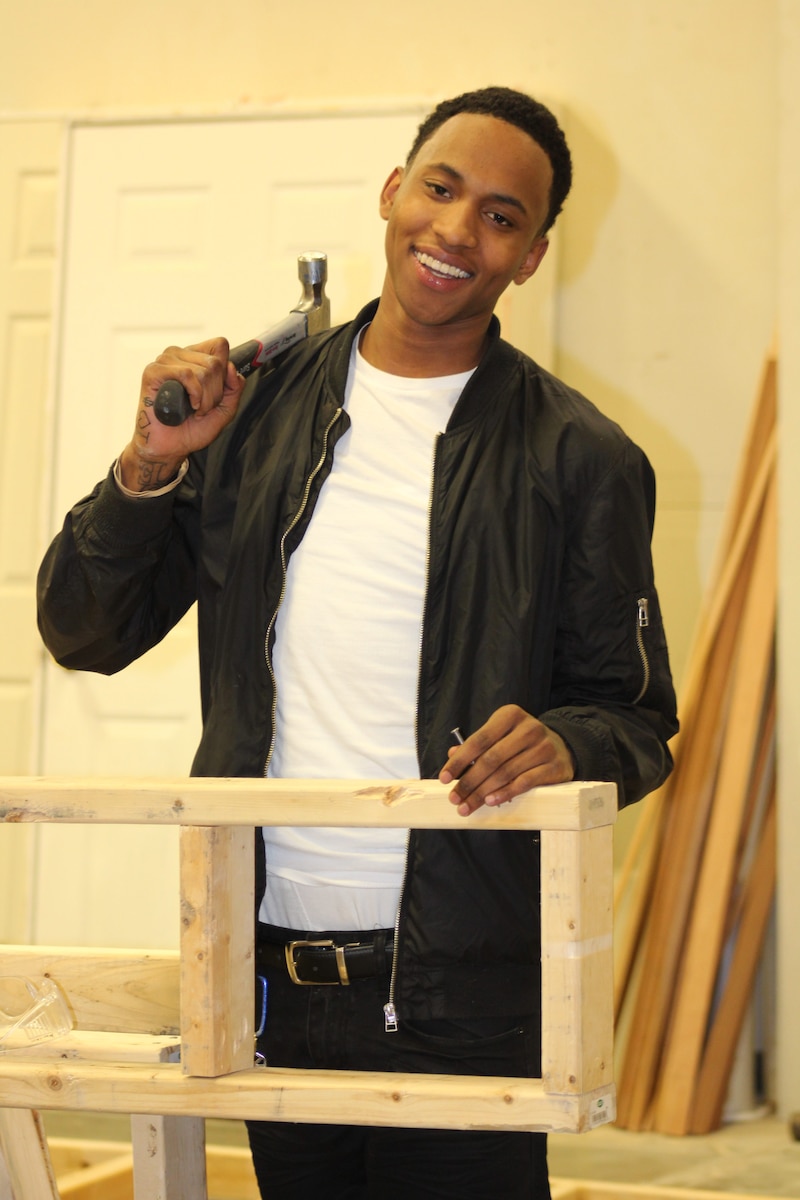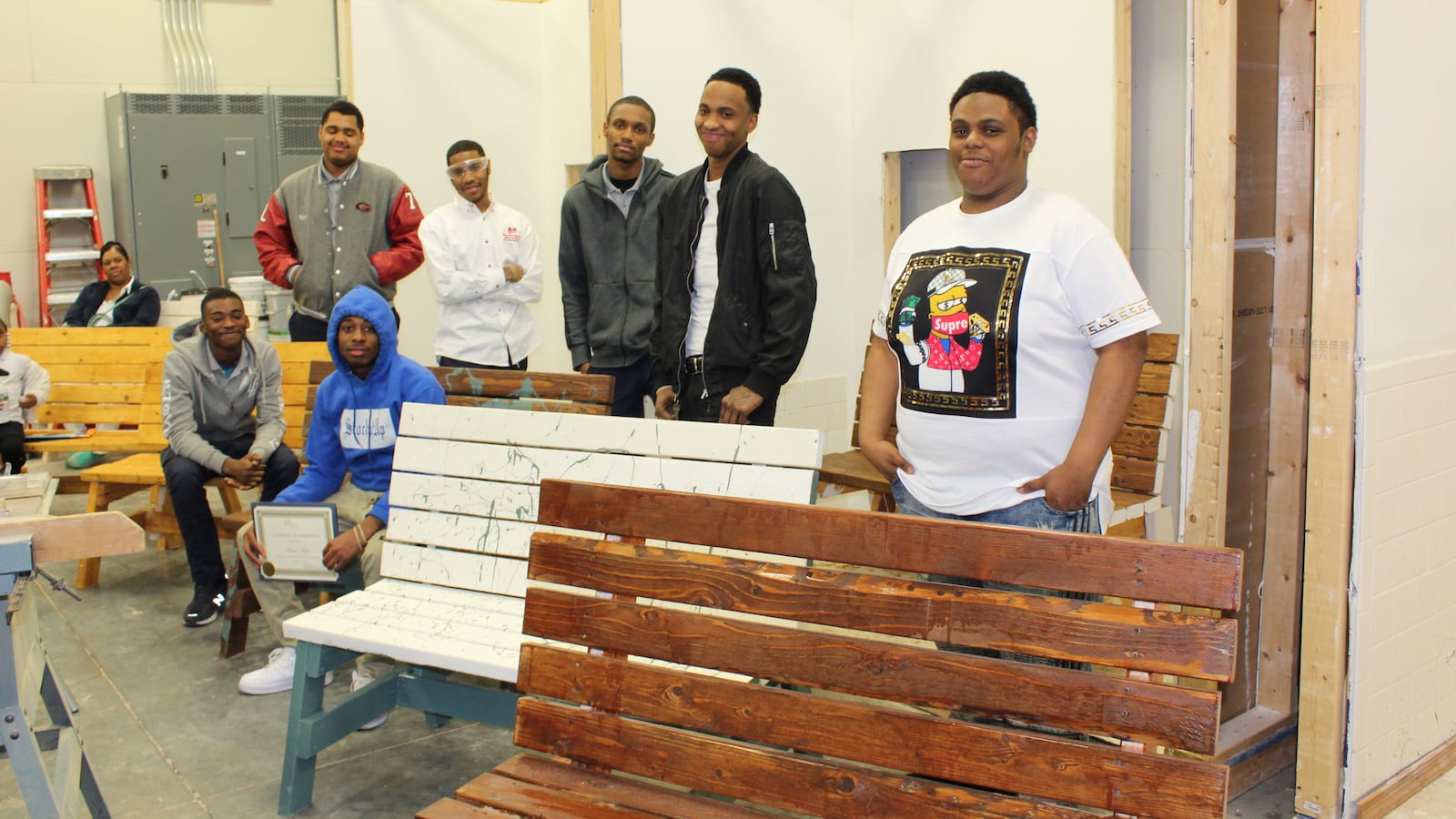This article was originally published in The Notebook. In August 2020, The Notebook became Chalkbeat Philadelphia.
Kim Brown could not have been more proud of her grandson Dionte Brown, a senior at Mastery’s Simon Gratz Charter High School in North Philadelphia.
Yes, the wooden bench the Feltonville 19-year-old made as part of Gratz’s after-school program at Orleans Technical College in Northeast Philadelphia looked fine and sturdy, and it would be great for any family’s front porch.
But there was more.
“I can see the turnabout in him,” she said. “He used to walk around all evil and mean, and now he comes around and helps.”
S

he was talking about Dionte on graduation day at Orleans for eight Gratz seniors who got a chance to see what it would be like to have careers in carpentry, electrical work, plumbing, and painting during an eight-week, 16-session after-school program.
“Life is about opportunities and trying things on,” said Sarah Hollister, vice president of youth and gateway programs at JEVS Human Services. JEVS, a non-profit social service agency, operates Orleans and provides a panorama of services to youth, elderly people, veterans, and people with disabilities.
Hollister said JEVS and other educational organizations are increasingly trying to find ways to allow students to sample more careers, so they can make better decisions and gain exposure to worlds beyond their own neighborhoods and schools.
That’s what happened for Siddeeq Bowie, 18, of Germantown, who graduated from Jules E. Mastbaum Area High School in June 2017.
As a youngster, he was always the kind of kid who took things apart to find out how they worked. He and his brother constructed whole cities out of Legos in the living room.
“We were always building something,” he said with a laugh.
At Mastbaum, he studied electrical technology and put his skills to use wiring home security and cable systems for Comcast one day a week as part of a school-industry program. The money was nice, too — $10 an hour.
Bowie started at Orleans on Oct. 30 in the commercial and residential electrical program, with an ultimate goal of buying, rehabbing, and selling houses. He graduated May 7 and has had several interviews, plus a job offer or two, but they are in the suburbs. He said Comcast would also like him to return.
He graduated with $5,000 in debt, but believes he’ll have no problem paying it down in a year. Getting work won’t be a problem either.
“Everybody needs some type of trade done in their houses,” he said. “Some-
thing always goes wrong with houses.”
Bowie’s father urged him to go to trade school. “I really can’t sit in a class and read books all day. I’m more a handson person,” Bowie said.
That’s exactly the point that Maureen Quiles-Rosa, college adviser at Gratz and the in-school coordinator for Gratz’s program at Orleans, makes again and again.
“We’re used to talking about post-secondary plans in a college sense,” said Quiles-Rosa.
She said counselors always talk to high school students about trade school, “but this gives them hands-on experience,” she said. “Some of these guys struggle in school academically, but this is a way for them to build their confidence.”
More than technical skills
When Dionte Brown gave his graduation speech, he talked about the skills he learned — dimmer switches, cabinetry, and installing toilets.
“More than learning these skills, I learned to be a better person. I gained more patience, perseverance, and responsibility. I know I can hold myself accountable, help others when they need help, and stay committed to something I believe in,” he said, as his grandmother, father, and other family members listened proudly.
Later, his grandmother described how he had fixed a door handle and repaired some drywall.
“This gave him something to do to occupy his mind,” she said. “He’s a good example for his brothers.”
For Dionte Brown and the other students, the program is free. It cost Mastery $10,000 to enroll and send the 15 students who began the program, Quiles-Rosa said.
Most of that money goes to JEVS, which hires the instructors and provides
the well-equipped technical space. JEVS bases its charge on the number of sessions, the cost of the instructor and materials, and the level of complication of the projects undertaken by the students.
So far, Mastery has been able to pay for the program through grants received through the educational improvement tax credit, a state program that gives businesses tax credits for donations to schools to augment their curriculum.
Quiles-Rosa said that she would love to see vocational training at her school, and every school, but that the capital costs of bringing in the necessary equipment are prohibitive.
“You need a ton of equipment,” she said, “so it’s not cheap to start a state-of-
the-art program.”
That’s why, Hollister said, JEVS targets schools that are not part of the Philadelphia School District’s Career and Technical Education program.
At Mastery Gratz, Quiles-Rosa said, “It’s pretty exciting, because it meets the needs of a diverse group of people.”
The crew at the current session includes a football player, some non-athletes, some students who struggle in the classroom, and others who could easily ace a four-year college program.
So far, it’s been all young men — one young woman enrolled, but she left
the program.
In school, this diverse group might not socialize much, but they form a bond, Quiles-Rosa said, as they take apart toilets, wire dimmer switches, and learn how to change the filters in their families’ furnaces.
And, educationally, the students may see the usefulness of subjects that
seem irrelevant in the classroom.
“Kids hate math, and they don’t see the point of it,” said Anna Bogdanov, academic affairs director at Orleans. “The instructors show them how math is used in context. They need to know how to build that bench and measure it so all the parts fit together.”
For Orleans, the program also serves as a recruitment tool. Several of the young men who graduated this winter said they hoped to return to Orleans for postsecondary education in the building trades. Tuition runs about $15,000 to $16,000 for a six-month course, with financial aid available, Bogdanov said.
‘My nephews’
At Orleans and the high school after-school program, the secret sauce is instructor Douglas Moore, a beefy African American man who wears his heart on his sleeve.
“The guys that come here really want something,” Moore said. “They want to learn, but they want more. The majority of them don’t have a father in their lives — some of them are incarcerated, some of them aren’t around. I call all my students my nephews, because I want them to know someone cares.”

Joseph Humphrey, who participated in the Orleans/JEVS program, poses with a hammer and nail. Photo by Jane M. Von Bergen
He said he offers them wisdom, including what he learned from his mistakes. “When I was young, I got in trouble on the street. I got arrested. I was shot. I dropped out of high school. I was selling drugs.
“They ask me how I did it, and I tell them that it came to a point, when I had my first child, that I wanted something better.
“They say I don’t know what it’s like. I tell them you have to be determined. Sometimes you can’t get out of your environment. It starts in your heart. I was tired of going nowhere. I wanted a career.”
For Moore, the building trades provided that career. And he understands how it feels to be a student, sitting in class, not understanding everything the teacher says.
“You have the weight of the world on your shoulders, because school can be boring,” Moore said. “But working with my hands, I could express myself. My students can express themselves.”
‘He has learned patience’
There was no shortage of expression at this winter’s graduation, with lots of cheering and clapping, joking and laughing, and posing for pictures. Everyone had to be photographed wearing safety goggles and pretending to fix the toilet.
Juanita Sumpter sat with her son Joseph Humphrey, 18, on the bench that he made. Both of them were beaming.
“He came to me and said, ‘Mom, can you buy paint?’ On a Saturday, he painted my whole upstairs. On Sunday, he did the downstairs,” she said. “He has learned patience. He has learned to take responsibility.”
With a couple of cakes waiting to be consumed, the graduation speeches were mercifully short, yet heartfelt.
Demire Sullivan-Gray said his group, the fifth to go through the program, had talent and had fun.
“We brought our hustle from the street and put our heart into the work,” Sullivan-Gray said in his speech.
Now, he said, he and his fellow graduates are better at the work and “we’re better off for it.”
The Notebook is one of 19 news organizations producing Broke in Philly, a collaborative reporting project on solutions to poverty and the city’s push towards economic justice. Read more at https://brokeinphilly.org and follow us on twitter @BrokeInPhilly



